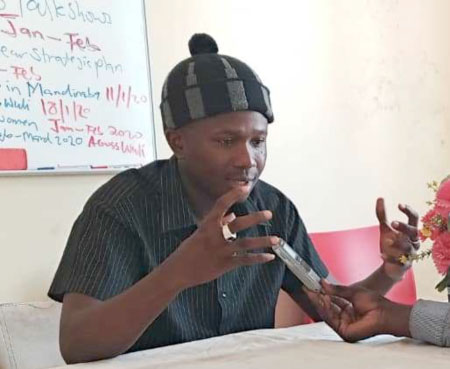
Female
Genital Mutilation and Cutting (FGM/C) Coordinator of Beakanyang has called for
concerted efforts towards ending the practice of Female Genital Cutting or
Mutilation in the country.
Ebrima
Njie made the statement yesterday at his office in Serrekunda, on the occasion
of International Zero Tolerance to FGM Day.
According
to him, despite many interventions by various stakeholders several women and
girls in the country continue to suffer from the brutal consequences of the
practice.
As
we mark this day, he added; “we need to do more to save thousands of girls and
women from the shocks of this practice that is harmful to their health and
violates their physical integrity and fundamental rights as women and children.
FGM/C
continues to violate the right of women and children in the Gambia and around
the world.”
According
to Njie, some of the immediate complication includes severe bleeding due to cut
across from the dorsal artery of the clitoris, shock also as a result of severe
bleeding and pain as well as urinary retention: due to pain and partly sealing
of the urethral orifice.
“It
could also lead to infection because of the unhygienic condition and
application of local treatment by the circumcisers,” he lamented.
He
hailed the various partners and stakeholders as well as communities for their
efforts in working and advocating for ending of the practice in the country.
FGM/C
continue to violate the right of women and children in the Gambia and around
the world. Some of this complication could be a violation of women’s
fundamental human rights, perpetrates the subordination of women and the
unequal distribution of power between men and women, have consequences for
health and wellbeing carries a heavy human and economic cost hinders
development.
Beakanyang,
he said, as a leading human rights organisation in the country is demonstrating
its commitment to ending the practice in a generation.
“We
will continue to work with partners internationally and locally to
strengthening our work in communities in creating a conducive environment for
women and children in The Gambia especially in the Upper and Central River
Regions,” Njie noted.
He
argued that Female Genital Mutilation will not end simply end by passing a law
but communities collectively and publicly advocate for Zero tolerance and work
together to end its practice.
Meanwhile,
according UNICEF at least 200 million girls and women alive today have
undergone some form of FGM and if current trend continue many more millions of
girls are at risk of being subjected to the practice by 2030.
The
United Nations sets aside 6th February as a day to globally recognize the need
to protect girls and women from all forms of Female Genital Mutilation (FGM)
dubbed “International Zero Tolerance to FGM Day”. This day is a UN designated day aimed at
drawing the attention of international and national communities of efforts
needed to accelerate action towards the elimination of FGM. The theme for this
year is “Unleashing Youth Power”
On
20 December 2012, the United Nations General Assembly adopted a resolution
banning female genital mutilation worldwide (A/Res/67/146), which was renewed
in December 2014 (A/Res/69/150). This historic step demonstrated the political
will at the highest level to bring an end to this human rights violation.
Article
4 of the resolution “Urges States to condemn all harmful practices that affect
women and girls, in particular female genital mutilations, whether committed
within or outside a medical institution, and to take all necessary measures,
including enacting and enforcing legislation, to prohibit female genital mutilations
and to protect women and girls from this form of violence, and to end
impunity”.


